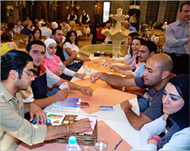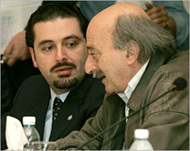Syrians ponder the price of sanctions
A French-US draft resolution threatening to step up measures against Damascus has raised Syrian concerns that the country’s already fragile state-controlled economy could be devastated if hit by international sanctions.

“The Syrian people are plagued with enough troubles,” said Husain Uwdat, a senior member of al-Atassi political dissident forum, which was banned by the Syrian government last May.
“We can’t put up with additional burdens like economic sanctions.”
The draft resolution warned that it would consider “further measures pursuant to article 41 of the [UN] charter, if needed, to ensure” Syria’s full cooperation with a UN inquiry into the killing of Lebanese former prime minister Rafiq al-Hariri.
Under Chapter VII of the UN Charter, Article 41 states that the Security Council may decide non-military measures to be employed to give effect to its decisions, such as a complete or partial interruption of economic relations and of rail, sea, air, postal, telegraphic, radio, and other means of communication, and the severance of diplomatic relations.
Unlike many Syrians, Uwdat described a recent UN report implicating senior Syrian officials in al-Hariri’s assassination as “professional”.
Syrian officials said the author of the 53-page report, UN investigator Detlev Mehlis, was biased and politically motivated.
Affecting the poor
Uwdat, however, voiced his concern that the US and other European states would use the findings of the report to push for economic sanctions on the entire country as it did against Iraq and Libya for 13 years and 11 years respectively.
“We cannot remain steadfast for that long. Libya and Iraq are oil-rich countries, and we are not,” said Uwdat.
About 2.2 million Syrians lived under the poverty line in 2004 and 2005 and were unable to ensure their own basic needs, according to a study published in June by the United Nations Development Programme (UNDP) and the Syrian Central Bureau for Statistics.
 |
|
A UNDP study put unemployment |
The study categorised 30% of Syria’s 18.3 million people as poor and estimated unemployment to be at least 20%.
Iraq, whose citizens suffered under economic sanctions for over a decade (UN reports cite 1.7 million deaths as a result), has 112 billion barrels of proven oil reserves. Libya has 38 billion barrels of proven oil reserves.
Syria has an estimated 2.5 billion barrels of proven oil reserves. And despite the decline of oil output and production, the World Bank has stated that the oil sector is generating 50% of the country’s revenues.
Nature of sanctions
Managing director of the Syrian Consulting Bureau for Development and Investment, Nabil Sukkar, has already examined sanctions on Libya so that he would have an idea what could be awaiting his country.
“It is not clear yet the nature of measures that the Security Council might take,” Sukkar told Aljazeera.net.
“Will they ban equipment to Syria? What sectors will be affected?”
The UN Security Council imposed arms and air embargo and a reduction of Libyan diplomatic personnel serving abroad in March 1992.
|
“The Syrian people are plagued with enough troubles. We can’t put up with additional burdens like economic sanctions” Husain Uwdat, |
The following year, the Security Council tightened sanctions on Libya, approving the freezing of Libyan funds and financial resources in other countries and banning the provision to Libya of equipment for oil refining and transportation.
“If they only freeze assets of people mentioned in the report, Syria will not be affected,” said Sukkar. “But if they freeze government assets, then it will be disastrous. But I don’t think they will go that far.”
Sukkar added: “If we cooperate, it’ll be okay.”
Oil exports constitute around 75% of total Syrian exports that Sukkar put at $5 billion annually.
But he said sanctions would not truly affect such exports. “It’s hard to control the destination of oil exports and, therefore, such sanctions cannot be really enforced.”
Against sanctions
Already, at least two prominent Lebanese political figures, who had campaigned for Lebanon to be free from Syrian military and political domination, have declared their opposition to economic sanctions against Syria.
Legislator Saad al-Hariri, the son of the slain Lebanese prime minister, said at a press conference with UK Foreign Minister Jack Straw in London on Tuesday that he was against sanctions that would affect the Syrian people, arguing that only those involved in his father’s killing should be punished.
Druze leader Walid Jumblatt has also said that any sanctions imposed as a result of al-Hariri’s assassination should be directed against “those who carried out the assassination” and not the people of Syria.
Thus far, Syria’s experience with sanctions is mixed.
US sanctions
Since 2003, the Syrian Ministry of Oil and Mineral Resources has awarded contracts for oil exploration and production to large international companies like Shell, Vancouver-based Tanganyika, Calgary-based Petro-Canada, Texas-based Gulfsands and Beijing-based China National Petroleum Corporation.
But other firms have pulled out from Syria either either because they did not find significant quantities of oil and gas or due to US sanctions and political pressure, such as Exxon-Mobil, Conoco-Phillips and Devon Energy.
|
“If they freeze government assets, then it will be disastrous” |
US sanctions on Syria were implemented in May 2004 under the provisions of the Syria Accountability Act of 2003. The sanctions include a ban on US exports to Syria except for food and medicine and a prohibition of Syrian planes from flying to and from the US.
US President George Bush issued an executive order in May last year empowering the secretary of the Treasury to freeze financial assets of those suspected of aiding Syrian authorities in contributing to what Washington sees as anti-American and anti-Israeli activities.
However, economic effects on the country were limited due to the small quantities of products traded between the US and Syria.
US pressure
But Washington has also pressured its allies to limit their dealings with Syria. Sukkar cited an example of the modernisation and expansion of the Tartous port that Japan was supposed to finance.
“Tokyo succumbed to US pressure and refused to give us the loan, so Syrian officials had to look for an alternative and approached the European Union, which granted us the loan,” he said.
 |
|
Saad al-Hariri (L) and Jumblatt |
The European Investment Bank provided a loan of 50 million euros to the Syrian Ministry of Transport last year to upgrade the port over a period of three years.
“US sanctions did not block it, but UN sanctions will block it, because we won’t have any alternative left,” said Sukkar.
“Syria will have to look for domestic resources to develop under sanctions,” says Qadri Jamil, a founding member of the Popular Committee to Combat Corruption that was set up last week.
Focusing on combating corruption is one main option, he said.
“We lose 20 to 30% of our gross national income as a result of corruption,” Jamil said. “And it is time for us to act so that we can survive if economic sanctions are imposed.”